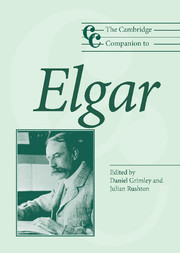Book contents
- Frontmatter
- 1 Introduction
- 2 Elgar and his British contemporaries
- 3 Elgar and his publishers
- 4 Magic by mosaic: some aspects of Elgar's compositional methods
- 5 Elgar's musical language: the shorter instrumental works
- 6 The early choral works
- 7 Elgar's later oratorios: Roman Catholicism, decadence and the Wagnerian dialectic of shame and grace
- 8 Roman Catholicism and being musically English: Elgar's church and organ music
- 9 ‘A smiling with a sigh’: the chamber music and works for strings
- 10 In search of the symphony: orchestral music to 1908
- 11 The later orchestral music (1910–34)
- 12 Elgar's unwumbling: the theatre music
- 13 Elgar and recording
- 14 Broadcasting's ally: Elgar and the BBC
- 15 Elgar in German criticism
- 16 Functional music: imperialism, the Great War, and Elgar as popular composer
- Notes
- Select bibliography
- Index
10 - In search of the symphony: orchestral music to 1908
Published online by Cambridge University Press: 28 September 2011
- Frontmatter
- 1 Introduction
- 2 Elgar and his British contemporaries
- 3 Elgar and his publishers
- 4 Magic by mosaic: some aspects of Elgar's compositional methods
- 5 Elgar's musical language: the shorter instrumental works
- 6 The early choral works
- 7 Elgar's later oratorios: Roman Catholicism, decadence and the Wagnerian dialectic of shame and grace
- 8 Roman Catholicism and being musically English: Elgar's church and organ music
- 9 ‘A smiling with a sigh’: the chamber music and works for strings
- 10 In search of the symphony: orchestral music to 1908
- 11 The later orchestral music (1910–34)
- 12 Elgar's unwumbling: the theatre music
- 13 Elgar and recording
- 14 Broadcasting's ally: Elgar and the BBC
- 15 Elgar in German criticism
- 16 Functional music: imperialism, the Great War, and Elgar as popular composer
- Notes
- Select bibliography
- Index
Summary
If any work by Elgar belongs to the internationally recognised canon of orchestral masterpieces, it is the Variations on an Original Theme, Op. 36; yet this was only his second large-scale orchestral work to reach performance. Elgar's growing skill and imagination in deploying large orchestral forces were already evident, and his claim that The Black Knight was a kind of choral symphony suggests a conscious direction of his career towards that form, ‘the highest development of art’. The Variations accomplished his first breakthrough to international success. The concert overture Froissart (Op. 19), composed for the Three Choirs Festival at Worcester (1890), is scarcely less remarkable, as the earliest of Elgar's larger orchestral conceptions to survive his self-criticism, or his unwillingness to finish large-scale compositions for which no performance could be anticipated; earlier works inspired by the Lake District and Scotland were abandoned, as was an early attempt at a violin concerto. By the time he composed Froissart Elgar was already well into his thirties, and its orchestral mastery derives from practical experience, as well as intense study of orchestral scores and alert listening when the opportunity arose. Elgar's break with what, in his intermittently tactless inaugural lecture at Birmingham, he identified as the ‘whiteness’, the ‘false rhapsody’, of English music is nowhere more apparent than in the brilliance of his orchestral inventions.
- Type
- Chapter
- Information
- The Cambridge Companion to Elgar , pp. 139 - 153Publisher: Cambridge University PressPrint publication year: 2005

